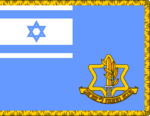Palestinians accused and IDF warned of war crimes

Attacks on Israeli civilians by Palestinians
Rocket and mortar fire as a war crime
B’Tselem
21.08.11
Palestinian organizations that fire rockets and mortar shells into Israel openly declare that they intend to strike Israeli civilians, among other targets. Aiming attacks at civilians is both immoral and illegal, and the intentional killing of civilians is defined a grave breach of the Fourth Geneva Convention and a war crime that cannot be justified, under any circumstance. Furthermore, the rockets and mortar shells are illegal weapons, even when aimed at military objects, as they are greatly imprecise and endanger civilians present both in the area from which they are fired and where they land, thus violating two fundamental principles of the laws of war: distinction and proportionality.
In a significant number of cases, Palestinians have fired the rockets and mortar shells from civilian residential areas. International humanitarian law (IHL) prohibits attacks from inside or near the homes of civilians, and using civilians as human shields. Palestinian organizations that choose to carry out attacks against communities in Israel from within or near populated areas breach this rule, and in doing so, demonstrate not only their intention to harm Israeli civilians, but also indifference to the lives of Palestinian civilians.
The Hamas government in the Gaza Strip must do everything in its power to stop the rocket and mortar fire, and the Palestinian organizations must cease attacks aimed at civilians, in particular when they are carried out from populated Palestinian areas. The government is responsible for the breaches of international humanitarian law, due to its failure to take sufficient action to stop the firing from areas close to civilian homes, and even more so, as it actively takes part in these attacks. The persons involved in these breaches are guilty of war crimes and bear individual criminal responsibility for their acts.
Data
B’Tselem’s research indicates that, from June 2004 to 22 August 2011, 19 Israeli civilians (four of them minors) and two foreign nationals were killed in Israel by Palestinian rocket and mortar fire. In addition, three soldiers were killed, one in Israel and two in the Gaza Strip. Another Israeli civilian and two foreign nationals were killed by Qassam rocket fire at settlements in the Gaza Strip, before they were evacuated. Palestinian rocket fire also killed six Palestinians (three of them minors).
One Israeli civilian (a minor inIsrael) and one soldier (in the Gaza Strip) were killed by an anti-tank missile fire.
A total of 31 persons have been killed by rocket and mortar fire, and two persons have been killed by anti-tank missiles.
According to the Israel Security Agency reports, in 2011 (until 31 July), Palestinian organizations fired 173 rockets and 192 mortar shells from the Gaza Strip into southern Israel, compared with 146 rockets and 211 mortar shells that were fired in all of 2010. For multi-year details (Data source: ISA website):
Year Rockets Mortar shells
2011 173 192
2010 146 211
2009 566 287
2008 2,048 1,672
2007 1,276 1,531
2006 1,722 55
2005 401 858
Attacks on Israeli civilians by Palestinians
Israel’s obligations in responding to rocket and mortar fire
B’Tselem
21.08.11
Under international humanitarian law, a breach by one side does not allow the adversary to relate to the entire area from which the rocket and mortar fire is launched as a legitimate military target. Although Israel has the right, and even the obligation, to protect its citizens from rocket and mortar attacks, it must do so by using means that comport with the requirements of international humanitarian law. The laws of war require the sides to direct their attacks only against specific military objects, to use means of warfare that cause harm proportionate to the purpose, location, and nature of the object, to take cautionary measures to prevent injury to civilians, and to refrain from acts that are likely to cause incidental loss of civilian lives, when the loss is excessive in relation to the military advantage anticipated.
Therefore, B’Tselem calls on the prime minister and the minister of defense to order the IDF to take all means of caution necessary to prevent injury to Palestinian civilians in the IDF’s response to rocket and mortar fire, and to ensure that the military action comports with international humanitarian law. Failing to do so, they and the relevant military echelon also might be held personally responsible for the commission of war crimes.
